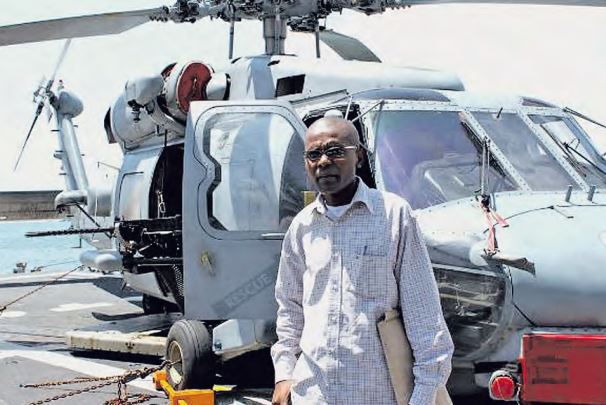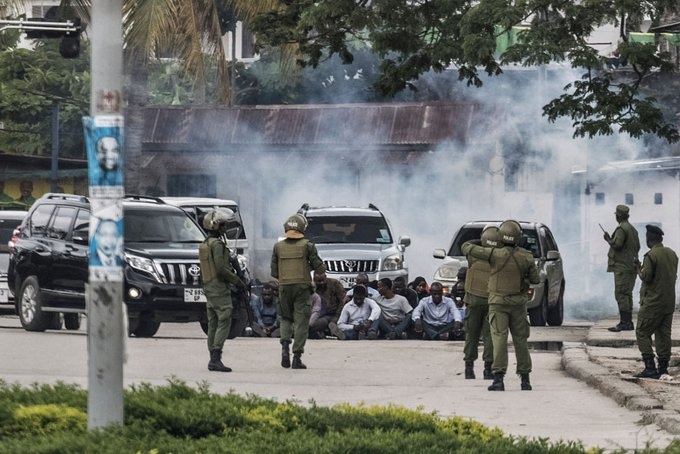Andrew Mwangura’s name is synonymous with seafaring, a reputation earned through decades spent at sea and his tireless advocacy for the rights of seafarers.
When pirates hijacked vessels or seafarers were stranded abroad, Mwangura was often the first point of contact for desperate families and shipping companies seeking peaceful resolutions.
For 18 years, he worked with leading shipping companies, gaining hands-on experience in salvage operations and conflict resolution.
He previously worked with well-established companies, such as Southern Oil Supply Company, Interbeton BV, Muri International, Stonia Marine, Vanuatu Maritime Administration, Sea Port Operations Limited, Somalia Report and Lloyd’s List Intelligence.
These formative years prepared him for his later role as a mediator in high-stakes salvage operations involving vessels held hostage by pirates.
Mwangura, who now boasts more than 38 years of experience as a seafarer, has been involved numerous times in negotiating for the safe release of seafarers and merchant vessels held captive by Somali pirates along the dangerous waters of Indian Ocean and the Gulf of Aden.
The former secretary general of the Seafarers Union of Kenya said his involvement in high-stakes negotiations during the height of Somali piracy in the 2000s and 2010s earned him international recognition, but it came at a personal cost. His work, often carried out behind the scenes, has saved countless lives, but it has also placed him in the crosshairs of powerful forces.
He said the governments viewed his work with suspicion, accusing him of sympathising with pirates, while criminal networks saw him as a threat to their lucrative operations.
“My work put me at odds with powerful entities, including criminal syndicates and political actors, making me a target of threats and intimidation,” he said.
“I faced allegations of collusion with pirates and I was detained in the past despite a lack of evidence.”
These challenges, however, only strengthened his resolve to fight for the rights of seafarers.
“I have successfully facilitated the safe release of numerous seafarers held hostage by pirates, and I have been recognised as an expert in maritime security, receiving invitations to speak at international forums and contribute to global policies,” he said.
He said his contributions to addressing piracy, maritime safety and human rights issues have made him a well-respected figure in the maritime sector.
In 2006, Mwangura won the “Combat on Commercial Crime Award” from the International Chamber of Shipping for his work in negotiating for the safe release of seafarers and merchant vessels held by Somali pirates.
He said he has also received numerous accolades for his humanitarian efforts and contributions to maritime safety and security.
Recognising the need for a platform to address the plight of seafarers, he founded the Seafarers Assistance Programme, a Kenya-based nonprofit organisation.
SAP became a lifeline for seafarers and their families, offering support in times of crisis, particularly during the piracy epidemic that gripped the waters off the Somali coast in the 2000s.
However, he said operating SAP with minimal funding has been a constant struggle. OMAN CASE In July, news of four Kenyan seafarers stranded at Port Duqm in Oman aboard the Somali-flagged fishing vessel FV Saharla hit the headlines.
The ship owner had abandoned the ill-fated crew members of the vessel since March.
The crew members aboard the fishing vessel, comprising four Kenyans, two Tanzanians and four Somali nationals, had also not been paid for eight months.
The Kenyans onboard the vessel were Abdulrahman Idd, Mwamba Nuru, Mwalimu Omar and Tela Hamisi Juma, who were all employed last year on a contractual basis.
Mwangura was at the forefront of pushing for their repatriation, and eventually, they came back home safe and sound on July 25.
He also called for the seafarers to be paid all their eight-month salary, amounting to $11,500 (Sh1.5 million).
Mwangura says his work has drawn attention to issues affecting seafarers, leading to improvements in maritime labour laws and policies around the globe.
In Kenya, he pushed for the ratification, domestication and implementation of the International Convention on Standards of Training, Certification and Watchkeeping for Seafarers (STCW), and the Maritime Labour Convention (MLC) 2006.
His efforts also included lobbying for the establishment of a dedicated Blue Economy ministry, which was previously a department under the Ministry of Agriculture and Fisheries.
Mwangura believed that Kenya’s maritime resources needed focused management to unlock their full potential, a vision that has since gained traction in policy circles.
Because of his expertise in maritime security, Mwangura has been invited to offer services as a lecturer and consultant on Maritime Safety and Security to several institutions, including the Harvard John F Kennedy School of Government and the European Security and Defence College. Other institutions include: the Institute for Security Studies, Dalhousie University, University of Nantes (Faculty of Law and Political Science), Bergen University and Institute for Strategic Studies, Perth, Australia.
Mwangura, who is also the chairperson of Mombasa Port Civil Society Organisations Platform, said in his quieter moments, he enjoys puzzles, chess and blogging.
Currently, he said he is working on his memoir, which promises to be a gripping account of the stories of security of the seafarers.
“I have been involved in writing so
many reports of maritime security,
now there is a push for all these details to be documented, and I have
now decided I will write a book,”
he said.













